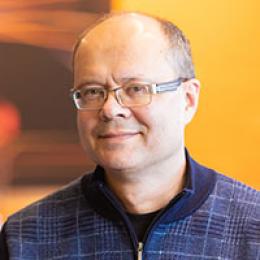It is conventionally expected that the performance of existing gas sensors may degrade in the field compared to lab conditions because (i) a sensor may lose its accuracy in the presence of chemical interferences and (ii) variations of ambient conditions over time may induce sensor-response drift. Breaking this status quo in poor sensor performance requires understanding the origins of design principles of existing sensors and bringing new principles to sensor designs. Existing gas sensors are single-output (e.g., resistance, electrical current, light intensity) sensors, also known as zero-order sensors. Any zero-order sensor is undesirably affected by variable chemical background and sensor drift that cannot be distinguished from the response to an analyte.
In this talk, we will demonstrate that to address these limitations, multivariable gas sensors are emerging as the next generation reliable analytical instruments. The talk will be structured as three segments that will cover the fundamental and practical aspects of design rules of multivariable sensors, sensor requirements for emerging applications, and comparison of performance of conventional and multivariable sensors with traditional analytical instruments.
Multivariable gas sensors (also known as intelligent sensors, multiparameter sensors, high-order sensors, and virtual sensor arrays) are individual sensors that are designed with several independent responses and operate as the first-order analytical instruments. We will present results from our numerous projects and from other research teams that demonstrate three-dimensional, four-dimensional, and even five-dimensional dispersion of individual sensors, differentiation of complex odors and closely related volatiles, and quantification of analytes in mixtures. Next we will discuss recent reported methodologies to improve stability of multivariable sensors. Design principles of electrical and photonic types of first-order sensors open opportunities for diverse emerging monitoring applications that cannot afford relatively high electrical power demands, relatively high instrument acquisition cost, and frequent periodic maintenance, typical of traditional analytical instruments.

Radislav Potyrailo is a Principal Scientist at GE Research leading the growth of GE’s industrial, consumer, and homeland security sensing technologies for gas, chemical, and biological detection. He has an Optoelectronics degree from Kyiv Polytechnic Institute (1985) and a PhD in Analytical Chemistry from Indiana University, Bloomington, IN (1998). At GE Dr. Potyrailo has been directing programs on designs of physical transducers, materials with multi-response mechanisms to ambient environments, data analytics, and system engineering. Dr. Potyrailo has been serving as a technical lead on GE R&D programs transitioned to GE businesses or GE partners for commercialization. Examples include optical multi-parameter chemical sensor for GE Water, wireless gas sensors for GE Oil & Gas, multi-parameter oil sensor for GE Renewable Energy, and GE Ventures start-up company on radio-frequency sensors. Dr. Potyrailo has been serving as a PI on programs funded by AFRL, ARPA-E, DARPA, DHS, DOE, DTRA, JPEO, NIH, NIOSH, NETL, and TSWG. Dr. Potyrailo is the initiator of the First Gordon Research Conference on Combinatorial and High Throughput Materials Science and serves as an editor of the Springer-Nature book series “Integrated Analytical Systems”. He is the North America Chair of International Society for Olfaction and Chemical Sensing and is the Chair of the Device Working Group of the MEMS and Sensors Industry Group. Dr. Potyrailo has 150+ granted US Patents and many publications (Google Scholar h-index 50+). He has delivered 15+ keynote/plenary lectures and numerous invited talks at National and International Meetings. He is a recipient of the Prism Award by SPIE/Photonics Media (2011) and the AMA Innovation Award (2021). Dr. Potyrailo is SPIE Fellow (2011) and recent IEEE Fellow (2023), covering the whole electromagnetic spectrum of his sensors. Dr. Potyrailo has been appointed as a Distinguished Lecturer of the IEEE Sensors Council for the period 2024-2026.

